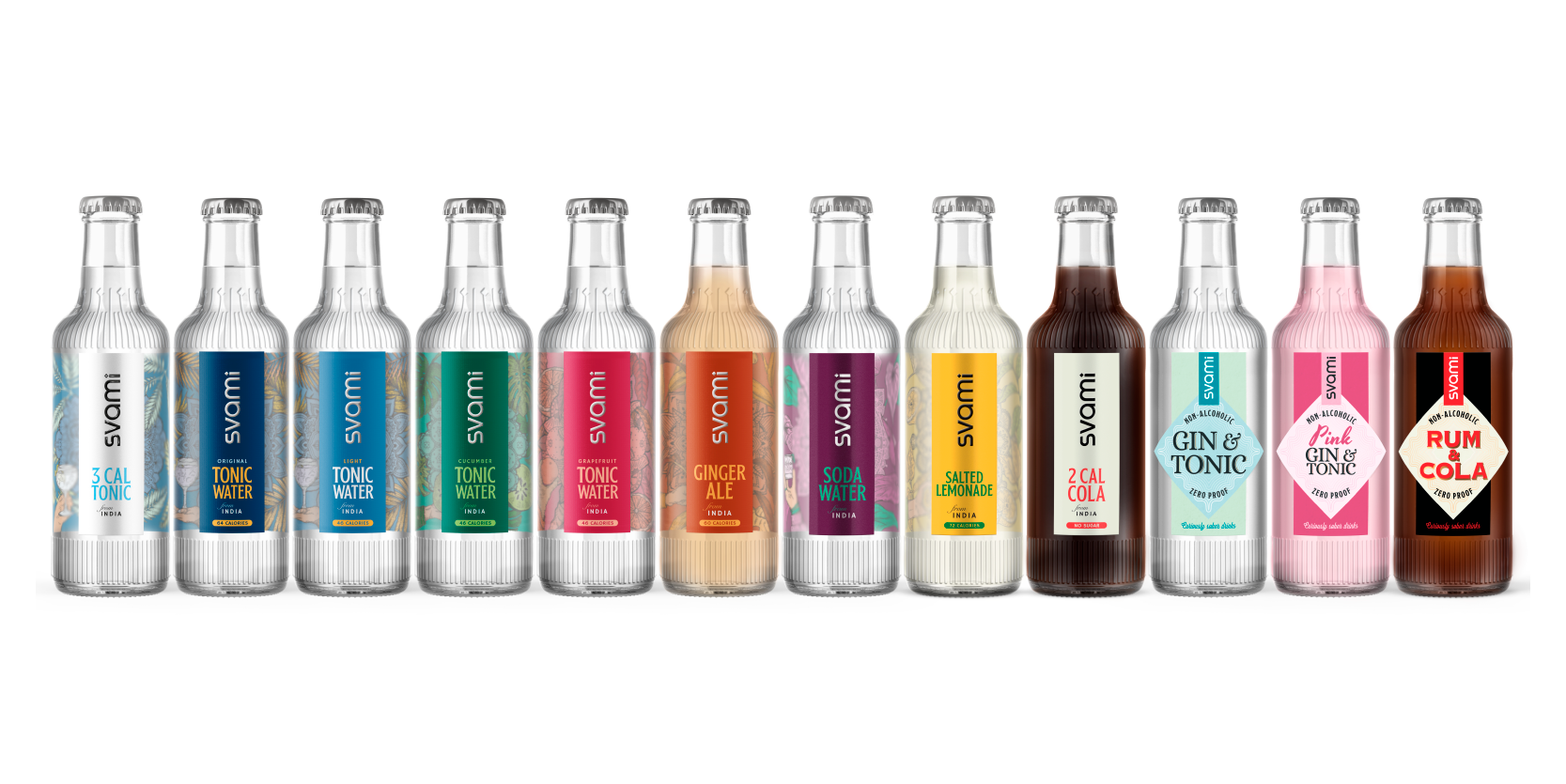In 2018, three friends — Sahil Jatana, Rahul Mehra, and Aneesh Bhasin — came together to do something with beverages, a natural choice for the trio given their experience and understanding of the space.
The idea was to give people an ‘upgrade’ and subsequently create niche products in the non-alcoholic segment, which was dominated by two or three global players at that time.
Starting with tonic water was an obvious choice as there was a distinct gap in the market, which was dominated by Schweppes. There was a need to upgrade amidst the rising popularity of gin, which led to the inception of the beverage startup Svami Drinks and its first product.
In the last three years, the Mumbai-based beverage startup has created a wide portfolio of 12 products across three major categories — mixers, non-alcoholic ready-to-drink (RTD), and ginger ale. The company witnessed revenue growth of 200 percent from 2020 to 2021 and is targeting Rs 100 crore revenue by 2024.
From making tonic water synonymous with the brand, to launching a diverse range of products, Svami has evolved to become a full-fledged beverage company.
Building a diverse portfolio
The timing played a crucial role in the success of Svami’s first product.
“We wanted to change the status quo of what was being offered with gin. The drink was picking up and was in the early stage of exploding in India,” says Sahil, who, along with his co-founders, took the help of their respective industry networks to gain insights.
The market was getting crowded. Brands such as Bengal Bay, Sepoy & Co, and Jade Forest had launched soon after Svami to disrupt the niche market of tonic water dominated by Schweppes. However, Svami had gained an early mover’s advantage and was able to shore up good numbers. Its local competitors, including O’Cean fruit water from Narang Group and Catch by DS Group, were also lagging behind in creating a ‘consumer-facing’ product.
In late 2019, Svami raised a fresh investment of Rs 7.5 crore in a pre-Series A round of funding from a mix of institutional and individual investors, to shore up its marketing efforts and move beyond tonic water.
The team found that the most logical extension of tonic water was flavoured tonic (grapefruit and cucumber), and started to offer them in Mumbai, Bengaluru, and Delhi.
Subsequently, more drinks such as ginger ale and soda were added to the portfolio. During the lockdown, it launched a 3 Cal tonic water — one of their largest sellers online, and non-alcoholic Rum and Cola, Gin and Tonic and Pink Gin and Tonic. The non-alcoholic RTD range helped Svami enter new markets and create a holistic brand identity.
“We slowly expanded into new cities like Chennai, Pune, and Hyderabad. With a new range of products launched last year, we have seen more penetration in Tier II cities as well,” says Sahil.
Besides a quality product, building a strong retail network is important for a brand’s growth. Svami has around 30 distributors along with an on-ground sales team and nearly 2,000 touchpoints across retail and Horeca (hotel, restaurant and cafe), including Ritz Carlton, Marriott Suites, Conrad, Sheraton Grand, and Westin.
The founder initially didn’t want to work with large distributors to maintain the “premiumness” of their products with selected small distributors.
Svami began by focusing on the Horeca market, which contributed almost 80-90 percent to its revenue. However, before the pandemic, the brand was working on making retail its mainstay.
“It was 35 percent retail, which flipped to 80 percent post-pandemic. We have grown offline retail by 4x and Horeca 2x by onboarding more cafes and introducing new non-alcoholic products,” he says.
Also, the brand has a strong advocacy programme where it onboards bartenders as brand ambassadors.
“Once the sales team closes a Horeca account, our bartender goes and conducts training, similar to what an alcoholic brand does. The bottle always goes on the table along with the drink. This is how we worked on the discovery and subsequently, the brand started building a strong retail network,” says the founder.
The brand has taken it slow in terms of its online outreach, given the logistical nightmare. Started in June 2020, online currently contributes about 10 percent to the company’s revenue.
Svami has also gained traction in international markets such as Hong Kong and Singapore, and is looking to enter the European market in the coming months.
In October 2020, the startup raised Rs 6.5 crore in a bridge round leading up to a Series A round, led by Mumbai Angels Network and participation from current investors including Rukam Capital Trust; Niren Shah, Managing Director of Norwest Venture Partners; and Ashish Chand’s family office — Yukti Securities.
The round was aimed to further strengthen the RTD market and grow the non-alcoholic beverage brand into a “mass premium” category.

Svami Drinks portfolio
Creating a 'mass premium' brand
The brand launched 2 Cal Cola and a salted lemonade to sweep deeper into its existing markets, besides Tier II and III regions. The average price of both beverages is Rs 65 — higher than the price of traditional brands but lower than the entire portfolio of Svami.
“The idea is to provide an upgrade of both the products. They will be cheaper than our current range of products but yet not unaffordable. It is the taste profile that will spell its premiumness,” says Sahil.
The launches are aimed to help the brand create a bigger retail footprint and penetrate deeper into the markets.
While Sahil refrains from branding Svami as a ‘premium brand’, he prefers calling it a ‘mass premium’. “A premium would be someone like Fever Tree or Franklin & Sons which sells at Rs 150-175. We are somewhere in between. Our prices are aspirational yet not unaffordable,” he says.
Keeping a pulse on new trends
Over the last three years, many millennials have moved towards sobriety as they are conscious of what they drink. As per a report by Mintel Research, 41 percent of young Indian beer drinkers aged 25-34 years are willing to switch to low or no alcohol beer, paving the way for non-alcoholic beverages.
“Our target market is not just people who do not drink alcohol but people who would 'like to have a drink and not have a drink', owing to the conscious consumption factor,” says the founder.
The R&D team has been given the mandate to try and come up with newer products and keep a pulse on people’s demand, new products coming into the market, alcohol trends, and so on.
Competitive advantage
Having its own manufacturing facility and in-house R&D is Svami’s biggest competitive advantage.
“All our competitors are using the same manufacturing facility located in Rajasthan. They do not have their own facility. I do not know how they will create a differentiator. Our second biggest advantage is the size of our portfolio. All the players are just focusing on three products — tonic, ginger ale, and soda — to close more and more Horeca accounts,” Sahil says.
Having its own facility gives the brand the needed flexibility to test the market where it can quickly churn out 1,000 bottles for trials, which is not possible with contract manufacturing.
The brand, like others, aims to disrupt Schweppes, which holds the majority chunk of the market share.
Energy drinks in the pipeline
Projecting a 3x growth in 2021, the immediate focus of the brand will lie in the two new products, along with the overall target of Rs 100 crore revenue by 2024. The startup is betting its next phase of growth on these low-priced premium products.
“We have plans to launch more low-priced non-alcoholic beverages and energy drinks that will be unique in terms of their taste profiles.”
Edited by Kanishk Singh
Link : https://yourstory.com/2021/09/mass-premium-non-alcoholic-beverage-brand-svami
Author :- Naina Sood ( )
September 18, 2021 at 06:00PM
YourStory


